Kingdom Come: Deliverance shows promise, but looks further off than it should
At E3 2017, I had the chance to sit down with developer Warhorse and their long anticipated title Kingdom Come: Deliverance. First appearing on Kickstarter in early 2014, the title has long missed its initial delivery estimate of Q4 2015. We finally just learned of its final release date a couple days ago, and with the title slated to finally arrive early next year I was excited to finally get my hands on this. What I encountered was promising, but also seemed to need a lot more time in the oven. What I played seemed like it was several years off, not a title that is dropping officially in less than a year and is already available to purchase and play on PC via its beta program.
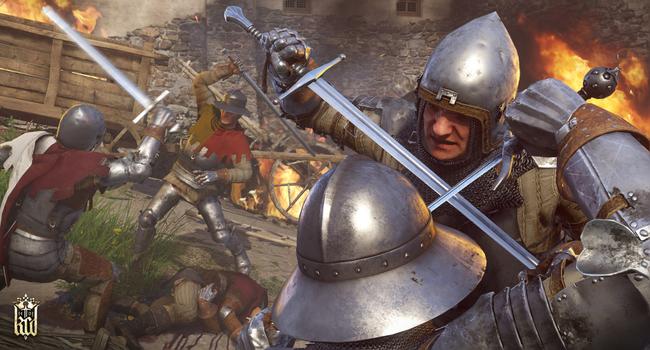
Despite the apparent shortcomings with the version of the game presented to me today, the title has a lot of potential and remains something that I am pretty interested in. Kingdom Come: Deliverance takes place in the year 1403 in Bohemia, modern day Czech Republic. The King of Bohemia, Wenceslaus, has been imprisoned by rebellious nobles and the King of Hungary, Sigismund of the Holy Roman Empire / Hungary is moving troops into the region, which is at the brink of civil war due to its absent King.
All of the story components for Kingdom Come are based on true historical events. I'm serious, you can go to Wikipedia right now to brush up on your eastern European history. The developers made it clear that they wanted to tell a story rooted in real conflict from human history. The game even has an in-game codex of sorts that will update as you play, including both characters and regions directly involved in the game as well as tertiary information about the politics and economic unrest during that point in history. If anything, Warhorse wants to make damned sure this title is more or less historically faithful to the time period. There are no Witcher potions or magical spells in this western fantasy.
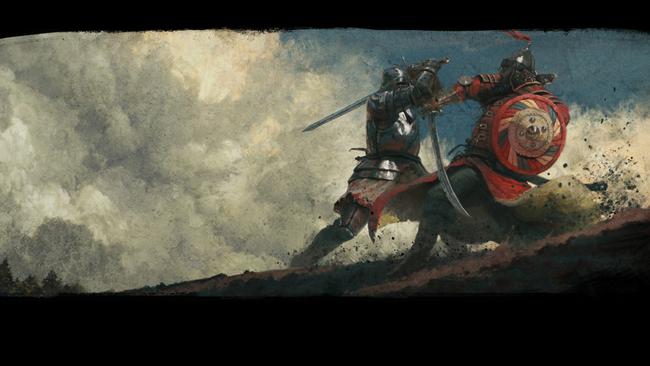
As for the story itself, the player takes the role of Henry, the son of a local blacksmith in a small village in Bohemia. The invading Holy Roman Empire kills his parents and he decides to take up arms in order to seek revenge. It's a pretty typical motivation for a western RPG, but it works well enough in the context of the game here. Though the quest demoed to me during E3 involved the player character waking up late to his father's request, which is as rote and eyeroll as possible for framing the outset of a narrative. I played through an initial series of quests which boiled down to getting the items necessary to forge a sword for the local knight. This involved getting a few items from a local drunkard who is initially unwilling to participate with you, as well as purchase an item from a local shop.
While not exactly sterling examples of engaging gameplay design, the functional nature of the early quests do at least do a good job of highlighting some of the game's systems, including its heavy use of dialogue based statistics. Nearly every dialogue choice will result in the player character gaining a bonus to certain skills, even including things like strength, which is imperative for equipping heavy armor. The usual gamut of dialogue or passive based abilities can also be boosted in this way, such as diplomacy and the ability to persuade other characters to perform things or provide information they wouldn't normally be willing to do or give otherwise.
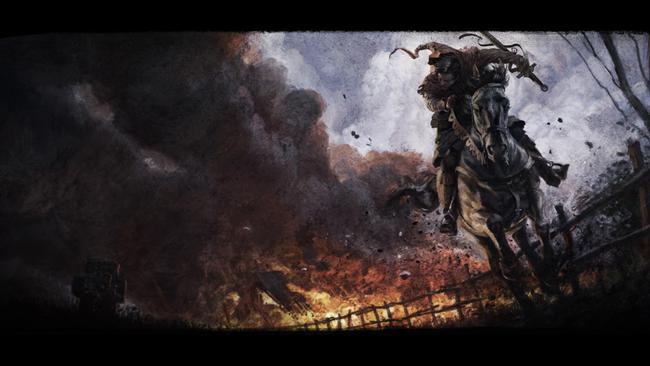
The capability to improve all (or most all) of your stats through dialogue is an interesting little wrinkle that Kingdom Come brings to the usual fare of progression in an open world RPG. However, the developers also made heavy effort to balance the gameplay importance of the various dialogue trees with a high degree of immediate consequence. Any statistical check made to an NPC can only be made once, and unless the player spends the time to get to know the ins and outs of a specific character's motivations (and more explicitly, the level of the stat check needed to pass), it won't be immediately apparent at which method of persuasion will be most efficient.
The developers even mentioned that other unique aspects of the current player-status will also affect persuasion chances: for instance, holding onto a bloodied weapon will give the player an easier time when it comes to intimidating an npc compared to those that try a similarly brutish bluff without the evidence to back it up.
To add to this level of permanence and consequence with respect to these dialogue options is the way that Kingdom Come allows, or put more accurately, restricts the number of times the player can save the game. While the game will automatically save periodically: after important story events or loading a new map, manual saves are limited to the number of save-potions held in the player's inventory. The demo gave me access to three of these, and while it's not clear exactly how abundant they will be in the full game, it's an interesting tactic to prevent save scumming in order to prevent side-stepping any consequence in a dialogue encounter by saving beforehand.
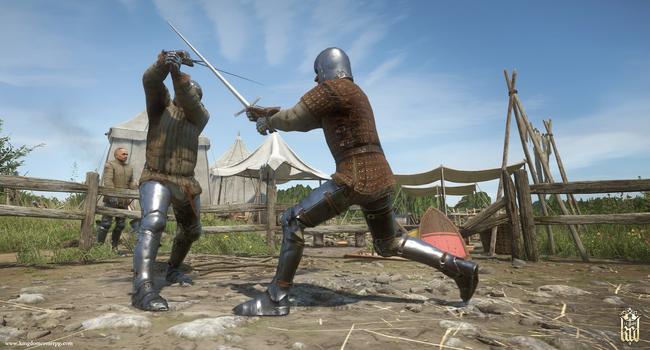
Combat is similarly intricate. There are 14 equipment slots that can be adorned with various levels of armor and weapons. While Kingdom Come offers some of the typical mechanics such as an encumbrance limit and a mobility / defensive tradeoff for wearing heavier armor, there are a few other mechanics at play with are uniquely tailored to the experience Warhorse is putting together with Kingdom Come.
For instance, wearing a heavy plated helm will partially obscure your vision, and might make it impossible to use a bow. Some helms will have a toggleable visor, but fighting with the visor up will protect the player less at the tradeoff of having a better awareness of their surrounding. Different weapons will be usable in different manners; some are better for slashing while others are better for piecing heavier armor with a stab or outward strike.
Combat in Kingdom Come takes place in first person and involves a fair bit of a learning curve to get used to. The player has to manage both a health and a stamina pool, with stamina being spent any time a weapon is swung or any time a shield is used to block an attack. These bars are not independent of each other either: having a lower health count will also lower the stamina available to fight effectively. It's a nice system that rewards careful play: taking too many hits and losing health early on in a fight will just make the rest of the encounter more tedious and difficult.
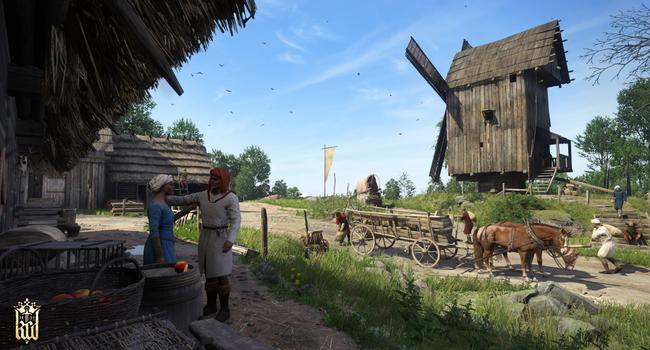
Overlaid over any foe in a combat encounter is a five-directional starburst, with one of the sections highlighted to indicate the area is currently targeted for a strike. The player will have to constantly keep in check where the enemies sword and shield are located in order to get in a clean hit, and not just be deflected to the side in a waste of stamina. The player can block any incoming attack too, and some weapons will allow the player a limited offensive movepool while the shield is up: for instance, being able to stab forward with the crest of a halberd seems to allow the player to keep their shield raised. Swinging with a sword leaves the player more open to counter attack if the player's blow ends up being parried.
Taking a hit from an enemy will stagger the player, and the camera will jolt away from the encounter as the player character attempts to regain composure. It's an annoyance to deal with in the middle of a combat encounter for sure, but it does add to the weight of the enemy blow, and being able to avoid absorbing these sort of debilitating blows is a reward in itself for skillful play.
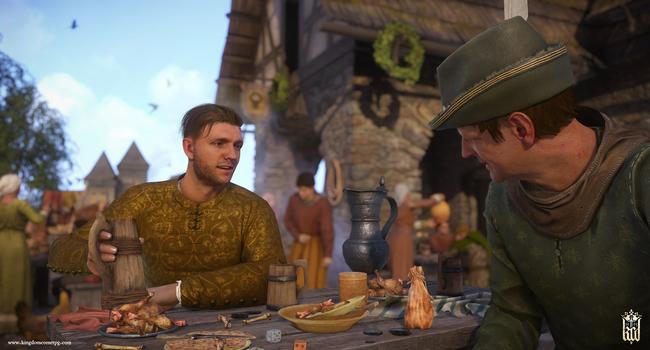
My one shortcoming with combat involved the blocking mechanic. Half of the time when blocking an enemy strike with my shield up, my stamina would deplete: indicated by more of the yellow stamina bar turning blue as it depleted, but there was no real feedback in game about the blow being blocked. No discernable sound effect, no staggering of the enemy foe as he recoils from hitting the shield. I was surprised a few times by an exhausted stamina meter due to not even noticing that I had blocked a number of hits.
My issues with the lack of polish also extend into the game-play proper outside of combat. For being such a heavy component of the game, dialogue moments seem extremely wooden and faked. Characters will stand as stiff as a board while elucidating on their life story or current thoughts. Lip flaps are not mocapped and are reminiscent of the fake fish lips used in 2003's Knights of the Old Republic, only somehow even worse. In a game slated for 2018, it just looks unfinished. I had a lot of issues with texture pop in and NPCs colliding on nearby buildings and other objects: one of my dialogue scenes was interrupted by a background character who couldn't figure out how to get around a stabled horse.
Characters outside of combat will walk woodenly from place to place, and awkwardly turn to face you if you decide to talk to them. There is an exceedingly awkward sense of Bioware-face whenever an NPC continues to talk on and on while barely moving their bodies; it takes me out of the moment for sure. In a world where games like Witcher 3 or even Dragon Age: Inquisition offer relatively dynamic character movements to match the environment and cutscene, it's an extremely poor look for Kingdom Come to fall so short of the mark. Pre-rendered cutscenes are passable, but anything rendered in game looks really unfinished.
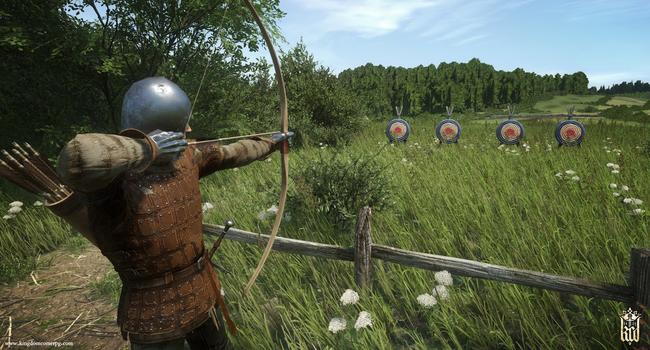
I still have high hopes for Kingdom Come: Deliverance. There's a small diamond interwoven with the interesting dialogue system and elaborate combat mechanics. But there's also a highly concerning lack of polish that dull any spark to be found here. I'll have to hope that the rough edges get buffed out before the game's full release next year.